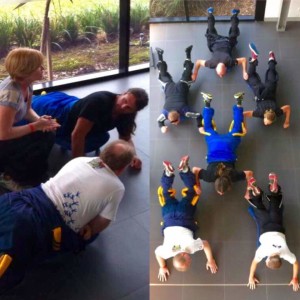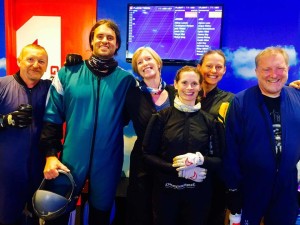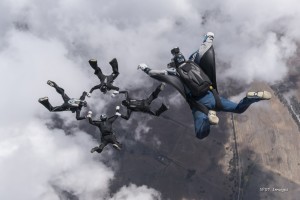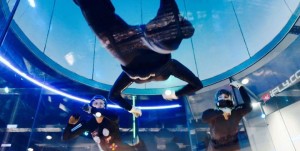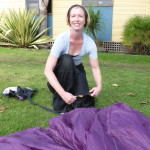Tips for Bigway Skills No 13

As athletes we need to train
We all share one goal. We want to be on the next Aussie Bigways record breaking team. And to do that we need to regard ourselves as athletes and train.
The anticipation of being there when the planes do a fly by and Greg Jack confirms that we ‘did it’ as we toast success as team mates is exciting indeed!
In 2015 there were too many disappointed people who were not on the final jump. In the time that the weather afforded us, some participants had been unable to demonstrate the skills required. In several cases participants said that they did not realise the level of skill that was actually needed or thought that their skills were enough.
Returning from that event, I created the ‘Skills and Events Guide’. Click here to see the Guide. The Guide maps out the skills you can work on to improve your chances of being on the team and what skills are required to participate at the different levels of event that the Aussie Bigways team offers.
The key thing to note is that participating in a Starcrest event does not give you a ticket to participate in a Bigway Camp event. Likewise, just because you are a regular participant in the Bigway camps, you will not automatically develop the skills to participate in an Advanced event. Other training pathways need to be followed to develop the skills required.
Where we come from
The initial cost to earn our A and B licences is huge. And so, whether you are someone inspired to start skydiving from seeing people achieve great things or someone who joined the sport and then discovered all the possibilities, after such a big initial investment you just want to ‘do it’!
Only to discover that it’s not actually that ‘easy’.
Safety takes a predominant role in APF governed training and understandably so. Our environment is a hostile one. With so many disciplines available in the sport now, Instructors have many different backgrounds and varied personal experience. This means that newly qualified jumpers emerge with a variety of information to work with.
Perhaps without realising it, newly qualified jumpers are now at a crossroads. The opportunity is there to enjoy the sport by having fun with friends, sharing the ‘big blue’ and the feeling of freedom that comes with it. The sport also offers the opportunity for challenge, to develop a level of skill that enables participation in competition, more complex moves, team activities, invitational events and records. Which turn is taken at this point and at others during our careers will depend on who we know, what our goals are in the sport and our own level of interest to invest in the outcome.
By choosing to be a member of the Aussie Bigways team, whether you have just got your Starcrest or have 1000’s of jumps, you have identified yourself as someone who wants to be involved in something, to do your bit in the team and to achieve.
Experience versus Training
Jumping regularly will keep you current in managing the sensory overload of skydiving and maintain your awareness in the air and under canopy. ‘Just’ jumping however will not develop your skills where you will simply use your current ‘toolkit’ to make things happen as best you can.
As in any other sporting practice, training with the support of professional advice helps you avoid picking up bad habits, helps you apply best practice and build the skills to perform consistently and in more complex situations.
If you want to improve your golf swing, do you buy the best clubs on the market and go and hit balls? No, you would get some advice, some coaching to know what you need to work on. You would understand the foundations from which you can create more power and precision in your hit, try it out with your coach then go and practice until you had embedded the changes. Then, with the new and improved foundation in place, you would go back for more coaching, evolving your skills over time until you achieve your goal. You might read books, watch videos, enter events to check your level against your target, play games with people who you know can offer you advice and visualise your swing whilst you are standing at the bus stop or waiting for your morning coffee.
Skydiving is no different. Just turning up to Starcrest days and Bigway camps will give you initial information and allow you to stay current. Coaches do their best to help individuals however their focus is to provide information, help newcomers gain a foothold and run a safe event. If you want to further develop your skills, participate at an Advanced level and be part of the next Aussie Bigways record, you need to do more. You need to take responsibility for your own skills development and train.
Each one of us will have different scope for the time, money and energy we can invest in our training. Take deliberate and proactive responsibility to understand what your options are and how to apply them to best effect.
How can I find out what I need to work on?
- Review the Guide and make a personal assessment of your current skill level. (Skills Guide here)
- At every event that you attend, ask the coach for feedback on specific skills and apply it to your assessment and focus.
- Hire a coach to carry out an assessment of your skills based on the level that you want to achieve.
- Seek feedback from more experienced skydivers who are already participating at the level that you aspire to.
- Ask Aussie Bigways Mentors and Coaches for feedback.
- Find your own mentor who will support you on your personal journey.
Open your mind to learning
Ask yourself these questions and set yourself up to be someone who can create the most effective learning opportunities:
- Am I coachable – can I take constructive criticism? Am I prepared to be an example to myself?
- Am I willing to practise? Can I be present – it’s not enough just to turn up!
- Am I willing to makes sacrifices? Can I prioritise what’s important in my training?
- Do I have the desire to improve? Not simply be reliant on being told what to do!
- Am I prepared to develop myself physically and mentally? Can I be intrinsically motivated?
- Do I believe in my team – my coach? Can I be humble?
Some good ways to train
- Talk to the coach of any camp in advance.
- Work with them to make the most of the day for you. Depending on the group, it may not always be possible to give you the opportunities that you ask for. However, if you don’t ask for opportunities and feedback then you may never know that you are below par. By asking, the coach will know you are committed to your own development and will find meaningful ways to help and challenge you.
- Work on your physical, mental and emotional resilience.
- Physical fitness, flexibility and mental resilience will determine the roles you can take on exit and in formation. Being fit opens more opportunities. You are also more likely to cope with the pressures of the event itself.
- Invest in your personal flying skills.
- Your ability to perform what is asked of you in any skydiving discipline will depend on how well you can fly your own body relative to others. The body position and mechanics of someone after B-rels may enable sufficient control to achieve a Starcrest qualification however it is likely to require further investment to support what is asked of you to perform well in big way camps, advanced events and 4 and 8 way teamwork.
- Jump with the same people.
- Communication, levels and relativity are just some of the things that can impact how well a skydive goes. By jumping with the same people regularly, these factors become known and so you have bandwidth to focus on developing other aspects of your flying.
- Learn 4 or 8 way.
- These disciplines offer the opportunity to fly in more dynamic and complex ways improving your awareness and ability to be part of the solution. They also reinforce good relative work practice that is invaluable for bigway skydiving. Just as in bigway skydiving, your level of personal flying skill will dictate your own performance and the overall performance of the team.
- Make use of the tunnel as well as air time in your training activities.
- The tunnel offers a fantastic tool to develop personal flying skills, 4 and 8 way and bigway skills. Maximise the effectiveness of this tool by training with a coach, skilled in the specific discipline.
- Do tracking jumps.
- Being able to flat track relative to others is a prerequisite to join the Aussie Bigways team in Advanced events, camps in Perris and the record event itself. Practice your track until you can pop and transition on a radial, converting lift to a flat track.
- Go to training camps outside of Australia.
- Consider participating in bigway training events in the US and Europe. Check out p3skydiving.com for camps held at Perris in California as one example.
- Visualise and expand your knowledge.
- Read articles, check out Aussiebigways.com, watch videos of perfect performance, watch your own videos and critique your performance.
The prospect of a successful 150 way in 2019 gives me goose bumps. See you there!
Melissa
Is an experienced and highly successful skydiving competitor and coach with a history of National and World level representation in 4way, 8 way and Big Way Formation Skydiving.
Melissa is a member of the Aussie Bigways coaching team, actively coaching at events and providing guidance to other coaches and Mentors in coaching and training best practice.
Passionate about making information transparent and removing the secrecy in the learning process Melissa is the co-founder of ‘Dimensions Flow’ a coaching organisation committed to helping skydivers achieve their goals. Recently her ‘Supercharge Program’ has been endorsed by Dan BC as one of the most efficient ways to develop best practice personal flying skills and fly with confidence relative to others, with friends, in bigway and sequential teams.
Contact Melissa directly to find out more about how her coached programs can help you achieve your goals.
melissaharvie@gmail.com 0408 553 561
Recommended Posts
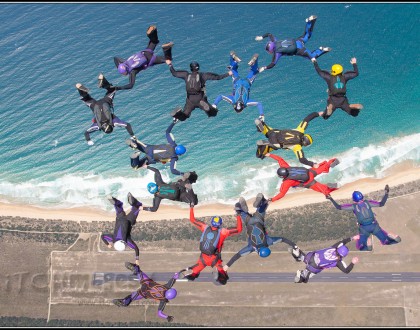
Captains Announcement June 2021
June 25, 2021
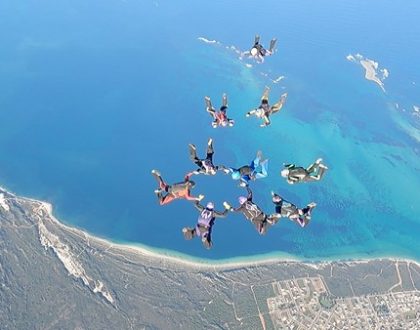
How Big is Big and What Makes a Record?
May 04, 2021
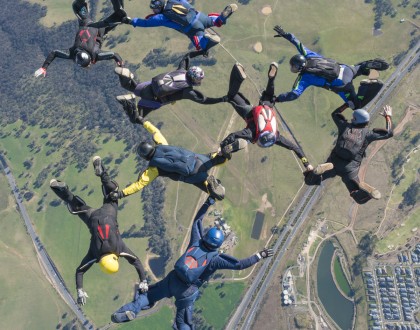
End Of Year Bigway And AdvancedOz Camps
October 22, 2020


